

5 Ways Modern Men Are Trained to Hate Women. Photos.com.
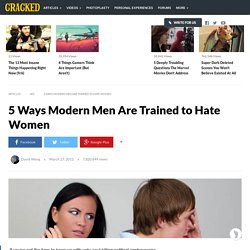
What's wrong in our schools. SecretCatPolicy comments on Real Life Role Models as Disney Princesses: Great Idea, Except...Yikes. Higher consciousness. Higher consciousness is the consciousness of a higher Self, transcendental reality, or God.
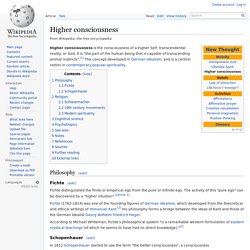
It is "the part of the human being that is capable of transcending animal instincts". The concept developed in German Idealism, and is a central notion in contemporary popular spirituality. Philosophy[edit] Fichte[edit] Fichte distinguished the finite or empirical ego from the pure or infinite ego. Lobotomatic comments on “God’s Not Dead,” But this Trope Is. Why the evangelical student embarrassing the arrogant atheist professor trope is not helpful. Epistemological. The Myth of Americans Living Beyond Their Means with Robert Reich. Joshua Foer: Feats of memory anyone can do. This Japanese Multiplication Method Will Divide Your Brain By Zero. Top 5 Biggest Barriers To The Tiny House Movement. I was driving into work today when the idea came to me for this article.

Why does it have to be so difficult to achieve the life so many of us would love to live? There are no simple answers to our reasons, but we need to face them head on. Since I don’t like to focus on the negatives too much, my next post will be on some of the possible solutions and approaches to overcome these barriers. UPDATE: Here are the solutions to these: Part 1 and Part 2 Land One of the largest hurdles for people wanting to live in a Tiny House is access to land. Loans. Carl Richards Napkin Sketches. Refusal of work. Refusal of work is behavior which refuses to adapt to regular employment.[1] As actual behavior, with or without a political or philosophical program, it has been practiced by various subcultures and individuals.
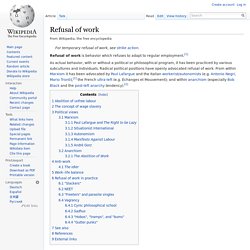
Radical political positions have openly advocated refusal of work. From within Marxism it has been advocated by Paul Lafargue and the Italian workerist/autonomists (e.g. Antonio Negri, Mario Tronti),[1] the French ultra-left (e.g. Échanges et Mouvement); and within anarchism (especially Bob Black and the post-left anarchy tendency).[2] Abolition of unfree labour[edit] International human rights law does not recognize the refusal of work or right not to work by itself except the right to strike. The concept of wage slavery[edit] Main article: Wage slavery Political views[edit] Editorial: How piracy changed my life. There have been many discussions lately about piracy and how to combat it, including some pretty radical measures.
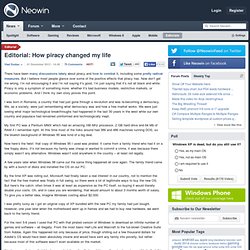
But I believe most people glance over some of the positive effects that piracy has. XqUWF.jpg (518×542) 12 Greatest Jon Stewartisms. Appeal to nature. An appeal to nature is an argument or rhetorical tactic in which it is proposed that "a thing is good because it is 'natural', or bad because it is 'unnatural'".[1] Forms[edit] General form of this type of argument:[2] N is natural.
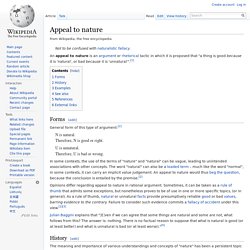
Dear Human... Davian behavior. Necrophilia, also called thanatophilia or necrolagnia, is the sexual attraction to corpses.
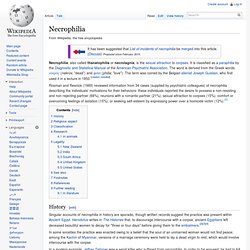
It is classified as a paraphilia by the Diagnostic and Statistical Manual of the American Psychiatric Association. The word is derived from the Greek words: νεκρός (nekros; "dead") and φιλία (philia; "love"). The term was coined by the Belgian alienist Joseph Guislain, who first used it in a lecture in 1850. [citation needed] Rosman and Resnick (1989) reviewed information from 34 cases (supplied by psychiatric colleagues) of necrophilia describing the individuals' motivations for their behaviors: these individuals reported the desire to possess a non-resisting and non-rejecting partner (68%), reunions with a romantic partner (21%), sexual attraction to corpses (15%), comfort or overcoming feelings of isolation (15%), or seeking self-esteem by expressing power over a homicide victim (12%).[1] History[edit]
Rational agent. A rational agent can be anything that makes decisions, typically a person, firm, machine, or software.
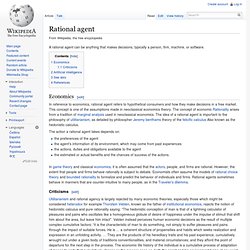
Economics[edit] In reference to economics, rational agent refers to hypothetical consumers and how they make decisions in a free market. This concept is one of the assumptions made in neoclassical economics theory. The concept of economic Rationality arises from a tradition of marginal analysis used in neoclassical economics. Humorism. The four humors Humorism, or humoralism, is a now discredited theory of the makeup and workings of the human body, adopted by Ancient Greek and Roman physicians and philosophers, positing that an excess or deficiency of any of four distinct bodily fluids known as humors (UK: humours) in a person directly influences their temperament and health.
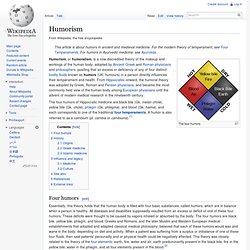
From Hippocrates onward, the humoral theory was adopted by Greek, Roman and Persian physicians, and became the most commonly held view of the human body among European physicians until the advent of modern medical research in the nineteenth century. Freethought. For the Ukrainian language newspaper published in Australia, see The Free Thought.

Freethought or free thought is a philosophical viewpoint which holds that positions regarding truth should be formed on the basis of logic, reason, and empiricism, rather than authority, tradition, or other dogmas.[1][2][3] The cognitive application of freethought is known as "freethinking", and practitioners of freethought are known as "freethinkers".[1][4] Freethought holds that individuals should not accept ideas proposed as truth without recourse to knowledge and reason. Thus, freethinkers strive to build their opinions on the basis of facts, scientific inquiry, and logical principles, independent of any logical fallacies or the intellectually limiting effects of authority, confirmation bias, cognitive bias, conventional wisdom, popular culture, prejudice, sectarianism, tradition, urban legend, and all other dogmas.
Symbol[edit] Sexology. Sexology is the interdisciplinary study of human sexuality, including human sexual interests, behaviors and function.[1] The term sexology does not generally refer to the non-scientific study of sexuality, such as political science or social criticism.[2][3] In modern sexology, researchers apply tools from several academic fields, such as biology, medicine, psychology, epidemiology, sociology and criminology.
Sexologists study sexual development (puberty), sexual orientation, sexual relationships and sexual activity, as well as document the sexualities of special groups; for example, child sexuality, adolescent sexuality, sexuality among the elderly and the disabled. Frotteurism. A sign outside of a bicycle parking lot in Chiba, Japan, warns "Beware of Chikan" Frotteurism is a paraphilic interest in rubbing, usually one's pelvis or erect penis, against a non-consenting person for sexual gratification. It may involve touching any part of the body including the genital area. A person who practices frotteurism is known as a frotteur. The majority of frotteurs are male and the majority of victims are female,[1] although female on male, female on female, and male on male frotteurs exist.
Richard Chase. Richard Trenton Chase (May 23, 1950 – December 26, 1980) was an American schizophrenic serial killer who killed six people in a span of a month in Sacramento, California. He was nicknamed "The Vampire of Sacramento" because he drank his victims' blood and cannibalized their remains. Early life[edit] Chase was born in Santa Clara County, California. Arrow. Depth Perception. 6 Books Everyone (Including Your English Teacher) Got Wrong. #3. Lewis Carroll's Alice's Adventures in Wonderland Anybody who grew up in the 1960s (and still remembers anything about it) can tell you what Lewis Carroll's classic children's book was really all about: A girl takes a "trip" down the rabbit hole and finds herself in a surreal world where animals start talking to her.
After she eats some "mushrooms," everything starts to change sizes before her eyes. The Death and Life of Great American Cities. The Death and Life of Great American Cities is a 1961 book by writer and activist Jane Jacobs. The book is a critique of 1950s urban planning policy, which it holds responsible for the decline of many city neighborhoods in the United States.[1] Going against the common wisdom of the age, it proposes new ideas that it says would ensure organic vibrancy in urban America. Contents[edit] In their place Jacobs advocated "four generators of diversity": "The necessity for these four conditions is the most important point this book has to make. In combination, these conditions create effective economic pools of use. " (p. 151) The conditions are: Derecho. Outliers (book) Four Temperaments. Neuroscience of free will.
Color Survey Results « xkcd. STA Snapshot 24 May 11 at 00.01 (129-38) Type Assistant -=Profile=- * * * * - "Relations of Duality". The partners usually appear to be very different in every respect and yet have almost ungraspable similarity, as if they were the two opposite sides of the same coin. Autodidacticism. Independent education without the guidance of masters Autodidacticism (also autodidactism) or self-education (also self-learning and self-teaching) is education without the guidance of masters (such as teachers and professors) or institutions (such as schools).